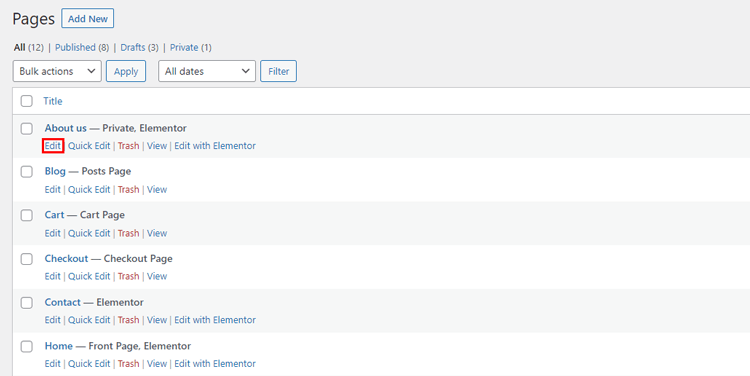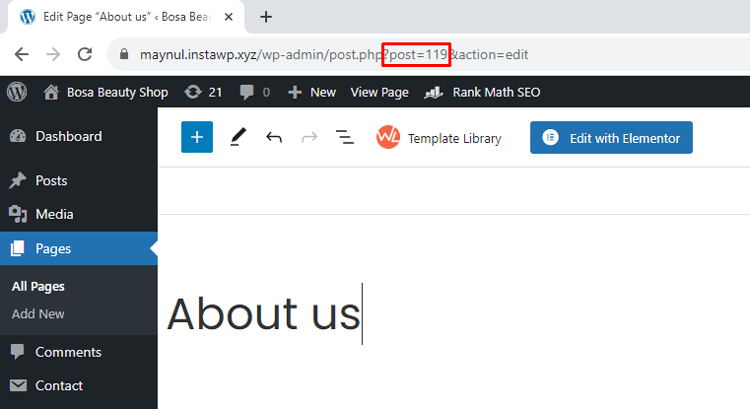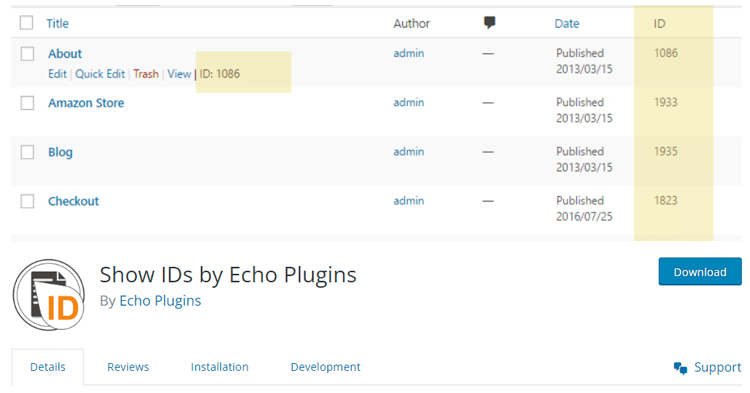
How to Find Page ID in WordPress: A Complete Guide
Navigating through the ins and outs of WordPress can be a daunting task for beginners and even experienced users. One key element that often puzzles users is finding the elusive Page ID.
But fear not! In this article, we will walk you through the step-by-step process of how to find Page ID in WordPress and shed light on why it’s important.
Understanding the Importance of Page IDs
When creating a WordPress post, you may have noticed that each page and post has its own unique ID number attached to it. This is known as a Page ID or Post ID, and it is an important piece of information that helps to identify your content on the backend of your website.
While this number may seem insignificant at first glance, understanding the importance of post IDs can greatly benefit your WordPress experience.
What is a Page ID?
In order to fully grasp the importance of page IDs, it is necessary first to understand what they are and how they function within the WordPress platform.
Every time you create a new post or page on your website, WordPress automatically assigns a unique numeric ID to that specific piece of content. This ID is used to identify the page or post within the database of your website. This means that every time you make a change to your content, whether it be updating the title or adding new images, WordPress uses this ID to locate and update the correct post or page.
In simpler terms, Page IDs serve as markers for each individual piece of content on your WordPress site, making it easier for the platform to organize and manage your content effectively.
Why do you need to know your Page ID?
Knowing your Page IDs in WordPress can significantly enhance your efficiency and productivity when managing your website. These Page IDs are integral in performing various tasks such as:
- Create Shortcodes or Widgets: Some plugins and themes use Page IDs for creating specific shortcodes or widgets. Knowing your Page ID can help you customize your site more effectively.
- Manage Permissions: If you need to manage permissions or restrict content access on specific pages, you’ll need to know the Page ID.
- Navigation Menus: When setting up navigation menus, WordPress uses Page IDs to identify which page should be linked in the menu.
- Troubleshooting: If you encounter any issues or anomalies with certain pages, knowing the Page ID can be beneficial in troubleshooting.
- SEO Configurations: Certain SEO plugins may require Page IDs for specific configurations to optimize your site’s visibility.
In essence, knowing your Page IDs can give you more control over your WordPress site, from managing day-to-day operations to optimizing for search engines.
Recommended Blog for You:
👉 How to Edit Menus in WordPress: The Quick and Easy Guide
👉 How to Duplicate a Page in WordPress: A Comprehensive Guide
👉 How to Add Data Table Widget in WordPress with Elementor: Complete Guide
👉 How to Customize blockquote in WordPress : Add Amazing Blockquote in 3 Simple Steps
How to Find Page ID in WordPress
There are a few different ways to find your Page IDs in WordPress, depending on the version of the platform you are using. Here is a breakdown of how to find page ID in WordPress:
Extracting Page ID from the URL
This method of extracting page ID is the simplest and easiest one. You can easily spot the ID in the URL of each post or page when you’re editing content in your WordPress dashboard.
Suppose you want to find the post ID for a particular post; simply click on the “Edit” option for that post.

As you enter the WordPress Editor, take a look at the URL displayed in your browser’s address bar.
For both posts and pages, you should observe something like “post=NUMBER” within the URL. This number is the post or page ID you’re seeking.

This same process applies even when dealing with pages in WordPress. Despite being pages, WordPress still utilizes “post” in the URL structure.
This method is not limited to standard posts and pages; it can also be used to find the ID for custom post types.
Support Genix
WordPress Support Ticket Plugin
A WordPress plugin adds the features of a comprehensive support ticket system to your WordPress site. Users may now create tickets and get help right from your WordPress site.
Using Plugins to Display Page IDs
If you frequently work with post and page IDs, you may prefer a more user-friendly approach to finding them. Luckily, there are numerous plugins available to assist you in this matter.
One such plugin is the free Show IDs, which can provide the necessary help. It adds an “ID” column to your WordPress dashboard, making it easy to locate post IDs and page IDs.

This plugin is incredibly lightweight, consisting of less than 100 lines of code. It won’t slow down your site with any front-end requests. Plus, there’s no need for configuration – simply install and activate the plugin.
With the Show IDs plugin, managing post and page IDs becomes a breeze, all while maintaining a user-friendly experience.
Alternatively, you have the option to utilize the Reveal ID plugin to achieve the same objective. The Reveal ID plugin is a valuable tool for advanced WordPress users and developers. It restores the hidden page and post IDs that were removed in newer versions of WordPress, allowing for more efficient work with specific plugins and template tags.
ShopLentor- WooCommerce Builder for Elementor & Gutenberg
A versatile page builder to build modern and excellent online stores with more than 100k Active Installations.
Practical Applications of Page IDs
Page IDs are unique numerical identifiers that are assigned to each page on a WordPress website. These identifiers serve as the primary key for database entries related to a specific page and can be used in various ways within the WordPress platform. In this section, we will discuss the practical applications of page IDs and how they can be useful in managing your website.
Customizing Page Templates
One of the most common uses of page IDs is in customizing page templates. Each page on a WordPress website can have its own unique template, allowing for greater flexibility and customization of your website’s design. For example, you can have a different template for your homepage, contact page, and product pages, all controlled by their respective Page IDs.
Enhancing SEO Optimization
Page IDs indirectly contribute to SEO optimization by helping you identify and manage individual pages effectively. You can use Page IDs in conjunction with SEO plugins or custom SEO strategies to target specific pages for optimization. For example, you can create unique meta titles, descriptions, and keywords for each page based on its ID.
Additionally, when tracking SEO performance and analytics, knowing Page IDs helps you discern the impact of optimization efforts on individual pages, allowing for precise adjustments to improve rankings and user engagement.
HT Easy GA4
#1 📈 Google Analytics Plugin for WordPress
🚀 Supercharge your WordPress website with analytical insights. (Including WooCommerce Report)
Frequently Asked Questions
What is a Page ID in WordPress?
A Page ID is a unique numerical identifier assigned to every page or post on your WordPress website. It is used internally by WordPress to distinguish and manage individual pages and posts.
Are Page IDs permanent?
Page IDs are generally permanent and remain the same unless you delete and recreate a page or post. They provide a stable reference point for managing your content.
Can I use Page IDs for customizing page templates?
Yes, Page IDs are commonly used for customizing page templates. You can create unique templates for different pages by knowing and utilizing their respective Page IDs.
How do Page IDs enhance SEO optimization?
Page IDs indirectly contribute to SEO optimization by allowing you to create unique meta titles, descriptions, and keywords for each page based on its ID.
Are Page IDs the same as posts or page slugs?
No, Page IDs and post/page slugs are different. Page IDs are numerical identifiers, while slugs are human-readable, SEO-friendly URLs for your pages and posts.
Conclusion
Knowing how to find page ID in WordPress is an essential skill for website owners, developers, and anyone else working with the platform. Whether you are using the dashboard or a plugin, having access to these IDs can help you troubleshoot issues, create custom code, or simply organize your content more efficiently.
The ability to find and understand the Page ID in WordPress unlocks a world of possibilities for customization, functionality, and optimization. By following the methods outlined in this article on how to find Page ID in WordPress, you can confidently locate your Page ID and leverage their potential to enhance your WordPress experience.



